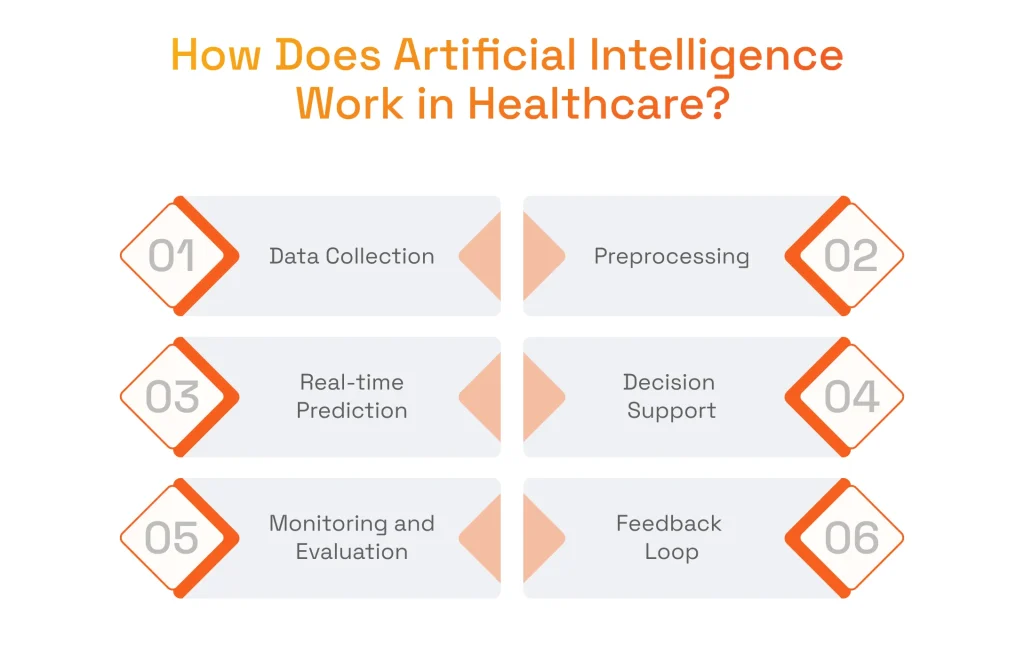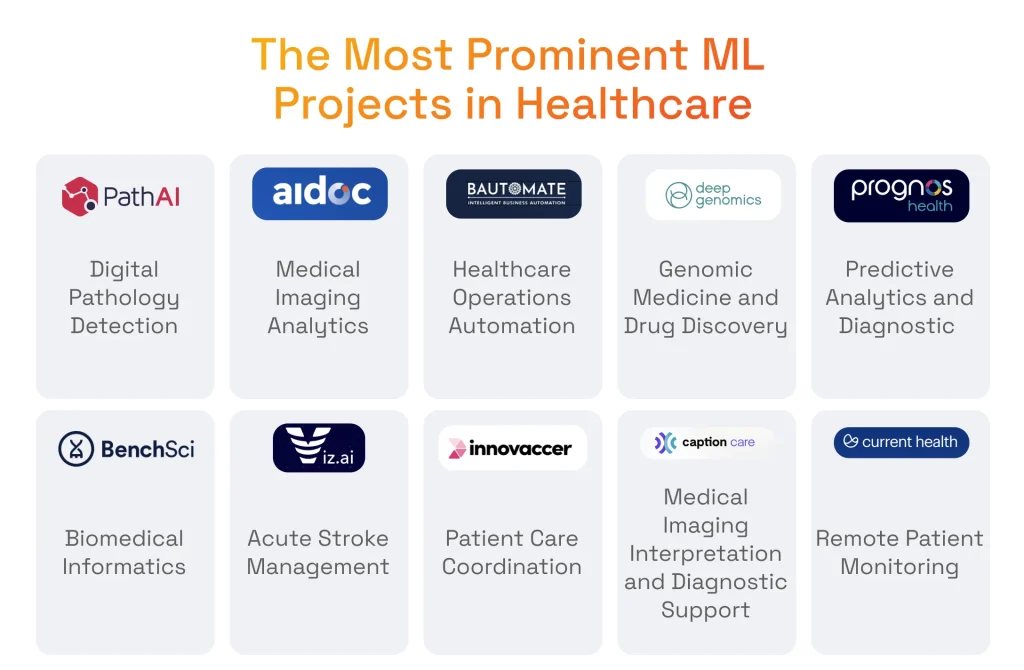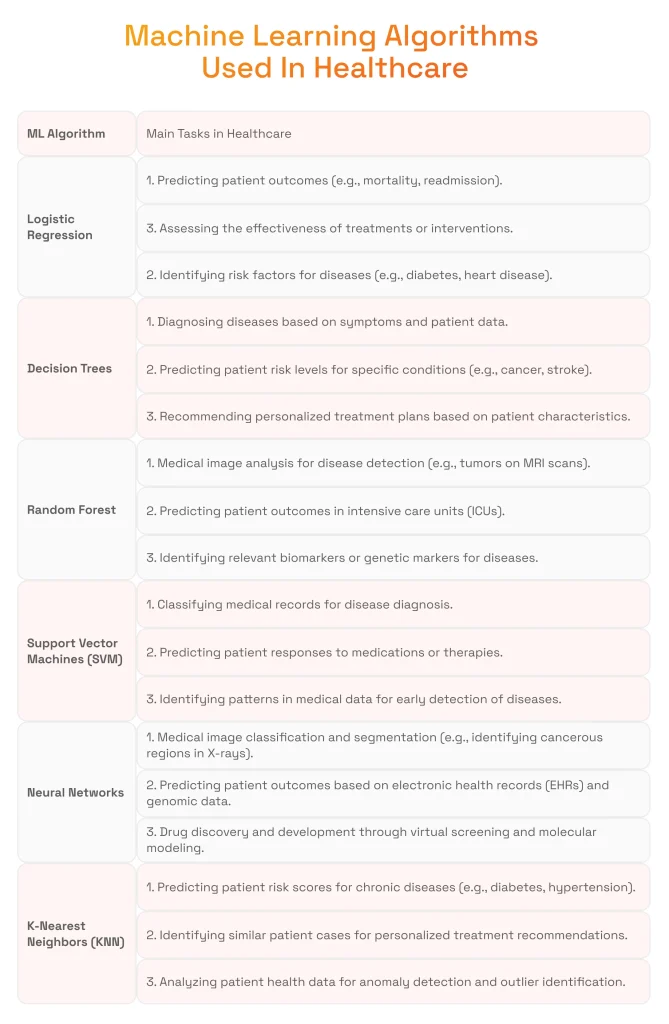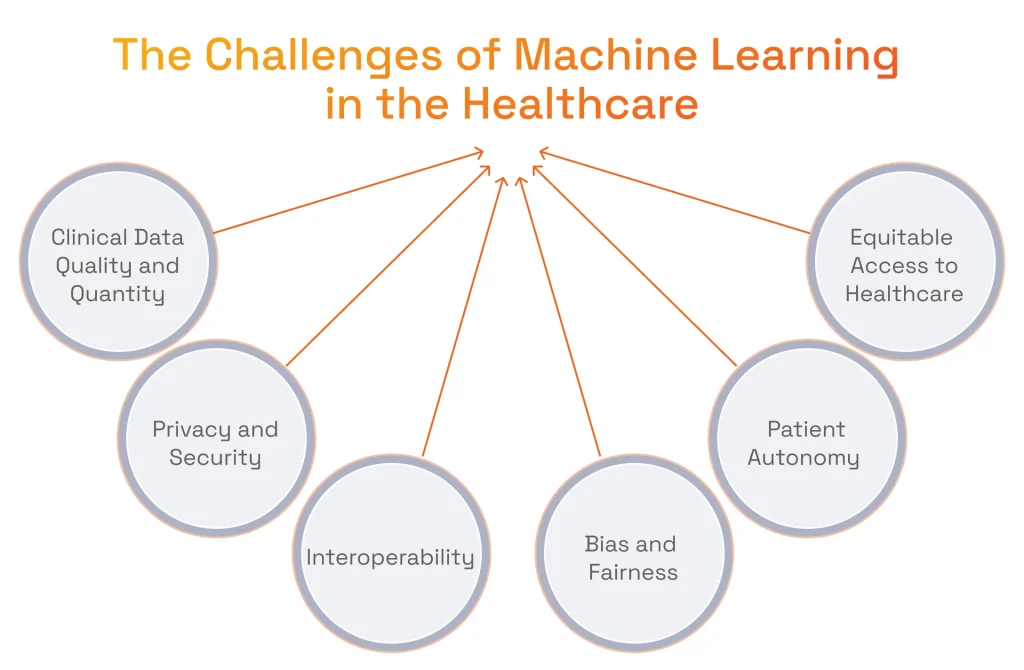Statista believes that by 2030, the global Artificial Intelligence market will reach a staggering USD 1,847,295. This growth is driven by the top industries including Retail, Banking, and Manufacturing, while the Healthcare sector is definitely among them. The adoption rate of machine learning in Healthcare is increasing exponentially, with a growing list of use cases from medical imaging analysis to the drug discovery process.
According to Grand View Research, the global AI in Healthcare market size was estimated at USD 22.45 billion in 2023 and is expected to expand at a compound annual growth rate (CAGR) of 36.4% from 2024 to 2030. While artificial intelligence is definitely transforming the healthcare landscape, let’s discuss the most prominent ways to apply AI innovations to improve the work of medical professionals in 2024.
How Does Artificial Intelligence Work in Healthcare?
Let’s start by answering the question: “How is Machine Learning used in Healthcare?” For that, it is vital to determine what tasks AI and ML helps to accomplish in the Healthcare industry.

- Data Collection: AI can be a great help in aggregating and managing vast amounts of patient data from diverse sources, including Electronic Health Records (EHRs), wearable devices, and other medical records systems. It is even possible to collect voice data and convert it into text with the help of Natural Language Processing. This comprehensive dataset encompasses critical information such as the patient’s medical history, symptoms, lab results, imaging scans, and treatment outcomes.
- Preprocessing: At the next stage, the trick is that we can’t feed collected data into the Machine Learning algorithms from the get-go since one additional step is required. The preprocessing step is essential to ensure data quality and compatibility. AI algorithms clean noisy data, normalize values, and perform feature engineering to extract relevant information and create meaningful features that enhance the algorithm’s learning process.
- Real-time Prediction: Now, when high-quality data is extracted, machine learning algorithms can operate in real-time, continuously analyzing incoming patient data to make predictions or classifications. For instance, based on a patient’s symptoms and medical history, AI can predict the likelihood of certain diseases or conditions, enabling timely interventions and personalized care plans. The same concept works perfectly for other industries as well, for example, predictive analytics in Retail, which unlocks the power of Demand Forecasting, Customer Segmentation, and Personalized Recommendations for the industry.
- Decision Support: Automated predictions may serve as invaluable decision-support Machine Learning tools for healthcare providers. By highlighting high-risk patients who require closer monitoring or recommending personalized treatment plans based on individual patient characteristics, AI assists healthcare professionals in making more informed and tailored clinical decisions. Similarly, decision support can be used in other industries, for example, for ML-enabled demand forecasting in Retail.
- Monitoring and Evaluation: Continuous monitoring and evaluation of machine learning algorithms are crucial to ensuring their accuracy and effectiveness over time. Healthcare organizations should closely track the algorithm’s performance, identifying any discrepancies or issues promptly to maintain reliability and enhance patient outcomes.
- Feedback Loop: As new data becomes available and additional outcomes are observed, Machine Learning algorithms should undergo periodic updates and retraining to improve their performance and adapt to evolving circumstances. This iterative feedback loop ensures that the algorithms remain responsive to changing patient needs and emerging healthcare trends.

Serhii Leleko
ML & AI Engineer at SPD Technology
“While working with data in the healthcare industry, it is important to always implement robust data governance policies to maintain the accuracy, completeness, and integrity of patient data. Make sure your organization adheres to strict data security and privacy regulations, such as HIPAA, to safeguard patient confidentiality and comply with legal requirements.”
Combining ML with Data Analytics in Healthcare
In such a data-intensive sector like Healthcare, Machine Learning can be blended with Data Analytics services to get access to tools for collecting, cleansing, structuring, and interpreting the massive amounts of data generated within the Healthcare system. With data analytics, healthcare organizations can transform raw data into actionable insights, build high-quality datasets for machine learning model training, and effectively visualize complex findings to improve their decision-making.
Healthcare Data Analytics specifically focuses on applying these analytical techniques to the unique possibilities presented by healthcare data. This includes the analysis of diverse data types such as electronic health records (EHRs), medical images, genomic sequences, and data from wearable technology. The insights derived from this data are crucial for:
- improving patient outcomes through personalized medicine
- enhancing diagnostic accuracy
- optimizing healthcare operations
- accelerating the pace of medical research and drug development.
The Real-Life Use Cases of Machine Learning in Healthcare Projects
There are already plenty of interesting ML implementations by healthcare providers. Let’s take a closer look at the most compelling Machine Learning use cases in Healthcare and what makes them exceptional.

Digital Pathology Detection
One of the notable examples of Machine Learning in Healthcare is demonstrated by PathAI that offers robust AI-powered products for pathology assessment across research and clinical development. Their solutions are for the accurate diagnosis of diseases from tissue samples, including cancer research, early detection, and grading.
PathAI products include:
- PathExplore: AI-powered panel of histopathology features that spatially characterize the tumor microenvironment.
- AIM-PD-L1: Detection and quantifying PD-L1+ tumor and immune cells. Available for biopharma and lab research use.
- AIM-HER2 Breast Cancer: Automated and reproducible digital HER2 scoring with explainable AI heatmap visualizations of breast cancer cells.
- AIM-NASH: Automated, reproducible, and validated AI-powered ordinal and continuous NASH CRN score component grades and fibrosis stage.
- NASH Explore: AI-powered panel of histopathology features that spatially characterize the NASH tissue biopsy microarchitecture.
- AIM-HI Ulcerative Colitis: Automated and reproducible Geboes scoring, sub-category scoring, and conversion to Robarts and Nancy scoring for ulcerative colitis.
- IBD Explore: AI-powered panel of histopathology features that spatially characterizes the inflammatory microenvironment in ulcerative colitis.
Medical Imaging Analytics
Aidoc delivers a powerful platform for the analysis of medical images, including radiology scans, CT scans, and X-rays, to assist radiologists in identifying critical findings and abnormalities.
In addition to that, the company offers enterprise-wide AI support for organizations, which includes:
- Automated Referral Network
- Identification of Suspected Abnormalities
- Care Team Coordination
- Prioritized Discharge
- Patient Management.
Healthcare Operations Automation
Bautomate has one of the most widely used Machine Learning applications in Healthcare. The company offers a business intelligence platform for Healthcare operations that aims to automate routine tasks.
In addition to the possibility of improving with AI in customer service, the solution covers a wide range of operational tasks:
- Claims Processing
- Payment Processing
- Appointment Scheduling
- Compliance Management
- Medication Management
- Population Health Management
- Clinical Documentation
- Audit Procedures
- Revenue Cycle Management
- Medical Coding.
Genomic Medicine and Drug Discovery Process
Deep Genomics leverages revolutions in AI, RNA biology, and automation to enable a new approach to drug discovery and development. Their AI Platform:
- Untangles the complexity of RNA biology
- Identifies novel targets
- Discovers the best therapeutic candidates
- Designs surrogate molecules for in vivo testing
- Predicts molecule-target interactions.
Predictive Analytics and Diagnostic
Prognos Health leverages AI and Big Data analysis to generate insights from clinical laboratory data, supporting early diagnosis, risk stratification, and treatment optimization. We already discussed the business impact of Big Data, so if you want to get more familiar with this concept, we suggest you read our article.
The company offers a set of solutions including:
- Prognos Oncology
- Prognos Rare Disease
- Commercial Analytics
- Precision Marketing.
Biomedical Informatics
BenchSci offers the disease biology generative AI in healthcare to help pharmaceutical companies’ R&D accelerate biomedical research and drug discovery by analyzing scientific literature, experimental data, and molecular pathways. The core of the solution is ASCEND, powered by their evidence engine, built from ontologies and multi-modal AI to understand the entire history of biomedical experiments and clinical trials with explainability and domain expertise.
This platform stands out among competitors by offering:
- Access to the most comprehensive biomedical dataset
- Scalable enterprise-grade software solution to support workflows that have never been mapped before
- Multimodal biological LLMs focused on understanding experiments from both text and figures
- Integration of internal pharma data (ELNs, sharepoints, materials) across all TAs with enterprise-grade security and service
- Science-first solution with scientific support and onboarding with 100+ scientists working hand-in-hand with over 100 engineers and AI experts.
Acute Stroke Management
Viz.ai offers an AI-based solution for the quick identification and triage of acute stroke cases on medical imaging, enabling timely intervention and treatment. The solution helps to significantly save time and improve patient and economic outcomes for organizations.
The solution consists of:
- Viz Neuro: for accelerated detection and treatment of suspected neurovascular diseases.
- Viz Cardio: for meeting patients’ cardiovascular needs.
- Viz Vascular: designed to transform patient outcomes into vascular medicine.
- Viz Trauma: streamlining communications and improving patient response regarding traumas.
- Viz Radiology: a suite of solutions for accelerating patient diagnosis and treatment.
Patient Care Coordination
Innovaccer offers an AI-enabled patient care coordination platform that integrates data from multiple sources, including EHRs, claims data, and wearables, to provide a comprehensive view of patient health and already helping 96,000+ medical professionals.
The solutions to combine into unified patient records:
- Health Plans
- Durable Medical Equipment
- Electronic Health Records
- Claims
- Labs
- Pharmacy
- Social Determinants of Health.
Medical Imaging Interpretation and Diagnostic Support
Caption Care delivers AI-driven medical imaging software that enables clinicians to perform and interpret ultrasound exams more accurately and efficiently.
The solution is aimed at:
- ACOs and Value-Based Care Providers
- Health Plans
- Employer Benefit Groups
- Concierge Medicine Providers
- Gaps Closure, Home Health, and Chronic Care Solutions.
Remote Patient Monitoring
Current Health offers a remote patient monitoring platform powered by AI and predictive analytics, enabling proactive Healthcare interventions and care coordination. The platform offers Healthcare providers services like Virtual Wards, Transitional Care, and Chronic Care, while pharmaceutical companies can benefit from Decentralized Clinical Trials and Commercial Deployment.
The platform offers:
- Remote patient monitoring
- Telehealth and patient engagement
- Clinical dashboard
- Integrations
- Virtual Monitoring Hub
- Clinical research
- Professional services.
Rising Applications of AI-Enabled Technology in Healthcare
The Global Healthcare IT market is expected to reach USD 974.5 billion by 2027, and AI technology is one of the key drivers behind this expansion. In this section, we’ll explore Machine Learning in Healthcare examples that are most likely to grow rapidly and make a big impact soon.

Computer Vision
Computer vision development services enable machines to process, interpret, and analyze visual information from the real world. In healthcare, this branch of AI helps to analyze medical images, improve surgical assistance and navigation, provide health monitoring and remote patient care, as well as boost drug development. Thanks to the advancements in deep learning and its ability to enhance early disease detection, we should expect the popularity of computer vision to grow.
Thanks to this use of ML in Healthcare projects, we successfully created a computer vision-powered API for a petcare mobile app. Our team successfully addressed noisy labeled data and its high imbalance between classes, ensuring data consistency and reliability for subsequent neural network development to achieve the goal of the project.
Robotic Process Automation (RPA)
RPA easily automates repetitive administrative tasks by mimicking human interactions with software systems. In healthcare, the most common use cases of this technology are streamlining EHR management, insurance claims processing and appointment scheduling. As the Global RPA Market is projected to reach USD 13.39 billion by 2030, it is safe to say that RPA will strengthen its position in healthcare due to its ability to save time, offer superior automation, minimize errors, and improve data quality in administrative processes.
Predictive Health
Similarly to the usage of AI for customer behavior analysis in retail, machine learning techniques in healthcare are aimed at forecasting future health conditions based on patient data. The biggest value lies in improving preventative care by identifying risks early, allowing for accurate, timely interventions. Two factors that are driving the growth of predictive health solutions are the increasing availability of patient data and the rising demand for personalized care.
Medical Training and Education with AR and VR Management
Demonstrating increasing value in the field of machine learning and healthcare, virtual and augmented reality technologies are transforming how patient care is administered and how medical professionals are trained. Thanks to analytical capabilities of ML, AR and VR Healthcare technologies simulate realistic medical scenarios, allowing healthcare professionals to practice skills and procedures in a safe and controlled environment. Medical training programs utilizing AR and VR simulations are a great way to enhance skill development, decision-making, and teamwork.
Machine Learning Algorithms Used In Healthcare
The progress-driving applications of AI in healthcare are powered by sophisticated machine learning algorithms. If you are new to the topic, we recommend starting with our introduction to machine learning, and we, in the meanwhile, will review the ML algorithms that form the backbone of advancements in diagnostics, treatment, and patient care.

- Logistic Regression: this algorithm is known for binary classification tasks. In the healthcare industry, it is used to determine the disease diagnosis and the presence or absence of a certain condition. In other industries, it is used for fraud detection with machine learning.
- Decision Trees: these Machine Learning algorithms in Healthcare are suitable for both classification and regression tasks and can handle a mix of numerical and categorical data. They are used in clinical settings where healthcare professionals and patients need to understand the reasoning behind diagnosis or treatment recommendations.
- Random Forest: it is an ensemble learning method composed of multiple decision trees that are highly robust and accurate. They are used for Healthcare ML projects where tech experts need to deal with complex datasets with high dimensionality and noisy or missing data. For healthcare organizations, where datasets are often incomplete, it is particularly valuable.
- Support Vector Machines (SVM): these are powerful classifiers, particularly effective in handling high-dimensional data and nonlinear relationships. They’re widely used used in Machine Learning projects for Healthcare, especially for tasks requiring accurate classification, such as disease diagnosis and patient risk stratification.
- Neural Networks: they are capable of learning complex patterns and relationships from large volumes of data. They’re highly versatile and find applications across various healthcare domains, from medical image analysis to clinical decision support and genomics.
- K-Nearest Neighbors (KNN): an effective algorithm for such Healthcare use cases for Machine Learning as classification and regression tasks. It’s particularly useful in scenarios with small to medium-sized datasets and can handle numerical and categorical data points effectively. It is quite popular for anomaly detection with machine learning tasks.
Ethical Issues and Concerns of Using ML and AI in Medical Services and Research
From an ethical standpoint, there is a lot to talk about. Some of the issues we are going to discuss are holding the evolution of Machine Learning in Healthcare back to some degree.
Bias and Fairness
Healthcare data often reflects historical disparities and inequalities, leading to biased representations of information on certain patients. For example, racial or socioeconomic biases may be present in diagnostic patient records or treatment decisions. AI models trained on biased data can amplify these disparities, leading to unequal healthcare outcomes for different groups. For instance, an AI algorithm for predicting disease risk may disproportionately misclassify certain demographic groups.

Serhii Leleko
ML & AI Engineer at SPD Technology
“To address bias in AI algorithms, we, at SPD Technology, carefully evaluate training data for biases, implement bias detection techniques during model development, and employ fairness-aware algorithms that explicitly account for fairness constraints during training.”
Patient Autonomy and Informed Consent
Patients may be unaware of how their health data is being used to train AI models or influence clinical decision-making. This lack of transparency can undermine patient autonomy and decision-making agency. Obtaining informed consent from patients for the use of their data in AI applications, however, is quite challenging due to the complexity of AI algorithms and the technical nature of machine learning processes.
During our projects, we encourage healthcare professionals to prioritize patient education and communication to ensure that patients understand the implications of AI in healthcare, including how their data is used and the potential impact on their care.
Equitable Access and Resource Allocation
The implementation of Machine Learning technology may widen existing disparities in access to healthcare services and resources, particularly in underserved communities with limited access to technology. AI-driven Healthcare interventions may disproportionately benefit well-resourced Healthcare institutions.
To promote equitable access to AI-driven healthcare solutions, we advise our clients to engage with local communities, prioritize community needs and preferences, and develop culturally sensitive and contextually appropriate interventions.
Machine learning is a trending technology in other industries as well. To discover how it impacts other niches, consider our guide on Artificial Intelligence and machine learning in Manufacturing.
The Challenges of Machine Learning in the Healthcare Sector
While the potential of Machine Learning projects in medical field is seemingly endless, there are still some significant challenges that should be addressed while building a Healthcare system powered by ML.

Privacy and Security
Machine learning systems rely on vast amounts of accurate patient data, which makes the concerns over privacy and security-relevant. Organizations should adhere to regulations like HIPAA and GDPR and mitigate any potential data breach risks while using Machine Learning in Healthcare projects. We, at SPD Technology, prioritize Healthcare cybersecurity, including data privacy and security, by using end-to-end encryption, access controls, and regular audits. In our Healthcare projects, we always integrate secure ML architectures to minimize risks while maintaining high performance.
Interoperability
It is common for Healthcare organizations to have data fragmented across various systems and formats, making it difficult for machine learning models to access it. Siloed systems and inconsistent data standards hinder the effective implementation of AI-driven solutions. We have extensive experience working with and redesigning legacy systems, so we know how to design solutions that can operate with multiple healthcare standards and protocols thanks to the development of robust data pipelines and connectors.
Data Issues
In addition to being fragmented, Healthcare data for Machine Learning has other issues that hinder the performance of ML models, including inconsistency, incompletion, bias, and the lack of structure. Our vetted AI/ML development services deal with these challenges by employing advanced data preprocessing techniques for unstructured data and automated data cleaning processes. We put in additional effort to identify and correct data bias, as well as communicate with our clients to improve the quality of data during the retraining of our models.
Choosing the Right Approach to Implementing ML in Your Healthcare Project
When executing Machine Learning projects related to medical field, even the smallest error may have significant consequences on patient safety, regulatory compliance, and the reputation of an organization. It is vital to make the right decisions while choosing the approach to secure patient data, ensure long-term success, and remain adaptable while the needs of your organization evolve.
Why Consider Professional Services?
Healthcare is probably one of the toughest industries to implement machine learning. In addition to the specialized experience and robust resources required to deliver highly tailored solutions that will fit the needs of your organization like a glove, ML projects in Healthcare also must comply with regulations like HIPAA and GDPR. Professional service providers ensure that your machine learning solution adheres to all legal and security requirements, reducing the risk of potential breaches or non-compliance issues.
Custom AI solutions in healthcare must be highly accurate to avoid misdiagnoses or incorrect treatment recommendations. Professionals ensure that models are trained with high-quality, unbiased data, reducing the risk of errors that could impact patient safety.
Why Choose Us for Your ML Project?
In addition to prioritizing patient safety and compliance, SPD Technology has practical experience in developing Healthcare Machine Learning projects. When you partner with us for an ML project, you are choosing a team of 643+ professionals with 18+ years of experience delivering 120+ projects for our global clients.
We have:
- Next-generation AI/ML development expertise in multiple industries, including Healthcare
- Skills in data quality management, which ensures the reliability of our models because they are trained on clean data. As a result, our models always make reliable conclusions
- Ensuring interpretability and transparency by following ethical AI/ML development practices.
Our Success Stories
Our track record speaks through the projects we’ve successfully completed. Here are some of our most recent case studies with some practical applications of machine learning for Healthcare that resulted in tangible benefits for our clients.
Developing an AI-powered iOS App with Computer Vision for Face & Wellness Analysis
Business Challenge
The client is a B2C company operating in the Healthcare industry with the mission to help people take care of their health and well-being, providing feedback on the process of aging and giving actionable advice on aesthetic wellness. The challenge was to build custom web and mobile apps for health and beauty monitoring with computer vision and Large Language Models (LMM) integration.
SPD Technology Approach
We utilized a custom dataset labeled under the direction of medical experts for the training of our AI/ML models. Our team leveraged computer vision to create functionality for facial analysis and aging estimation and tracking. To explain the results to users, we decided to go with a Retrieval-Augmented Generation (RAG) chatbot combined with a tailored LLM. We delivered this solution in the form of an iOS application that connects user smart devices and aggregates data powered with ML models wrapped into API.
Value Delivered
- Outstanding Customer Experience: we ensured a 95+% accuracy rate of the machine learning models running at the core of our healthcare app.
- Innovative Skincare Recommendations: we developed a killer feature for this product that provides skincare recommendations based on analysis of facial imperfections with a 90% accuracy rate thanks to our powerful computer vision algorithm.
Overall, we helped our client turn a business idea into a cutting-edge product, ready to get funded and become a paradigm shift in the industry.
Automating Processes with AI-Powered RPA for a Healthcare Provider
Business Challenge
Our client, an established healthcare provider, faced difficulties in managing patient onboarding, appointment scheduling, and claims processing. These problems with manual processes led to delays in patient care and financial reporting. The main challenge was to streamline the core processes while adhering to the regulations of HIPAA.
SPD Technology Approach
We started with an in-depth analysis of the current processes of our client, identifying bottlenecks and manual tasks that are suitable for automation. After that, our experts integrated RPA bots with the client’s EHR system, as well as with the other connected platforms. Our custom AI-powered RPA solution can accurately process patient forms, verify insurance claims (flagging discrepancies in them) and correctly schedule appointments without any human intervention. This solution was built with ensuring data privacy and security in mind, so it complies with all current standards and regulations.
Value Delivered
- Boosted Operational Efficiency: we managed to significantly reduce manual workload, cutting onboarding time by almost 60%.
- Improved Patient Satisfaction: our solution helped to reduce the error rate in administrative processes by 50% thanks to the effective automation of repetitive tasks.
Overall, the successful implementation of AI-powered RPA positioned the client as one of the leaders in Healthcare automation, driving future innovations for the industry.
Conclusion
The integration of Machine Learning in healthcare industry represents a groundbreaking paradigm shift, already bringing transformative benefits across the entire industry. Machine learning and Healthcare work together by harnessing the power of advanced algorithms and vast heath-related datasets for improving medical diagnostics, treatment planning, patient management, and medical research.
We can help you navigate the complexities of this growing technological innovation and leverage the benefits of Machine Learning in Healthcare for your medical organization. If you have any questions or need consultation, our tech and business-savvy specialists would be glad to help you!
FAQ
How Is Machine Learning Different from Traditional Data Analysis in Healthcare?
Machine Learning Healthcare projects analyze vast, complex datasets to identify patterns and make predictions without being explicitly programmed. Unlike traditional analysis, ML adapts and improves over time, offering deeper insights and enabling real-time decision-making for medical professionals.
What Kinds of Problems Can ML Solve in Healthcare?
Machine Learning can detect diseases early, personalize treatment plans, predict patient outcomes, automate diagnostics, and optimize hospital operations. It excels in analyzing medical images, genomic data, and patient histories to improve care accuracy and efficiency.
What Does Success Look Like for a Healthcare ML Project?
Success of a Machine Learning project in healthcare can mean achieving measurable improvements in patient outcomes, diagnostic accuracy, or operational efficiency. It also includes smooth integration into clinical workflows, high adoption by medical professionals, and compliance with Healthcare regulations and data privacy standards.

